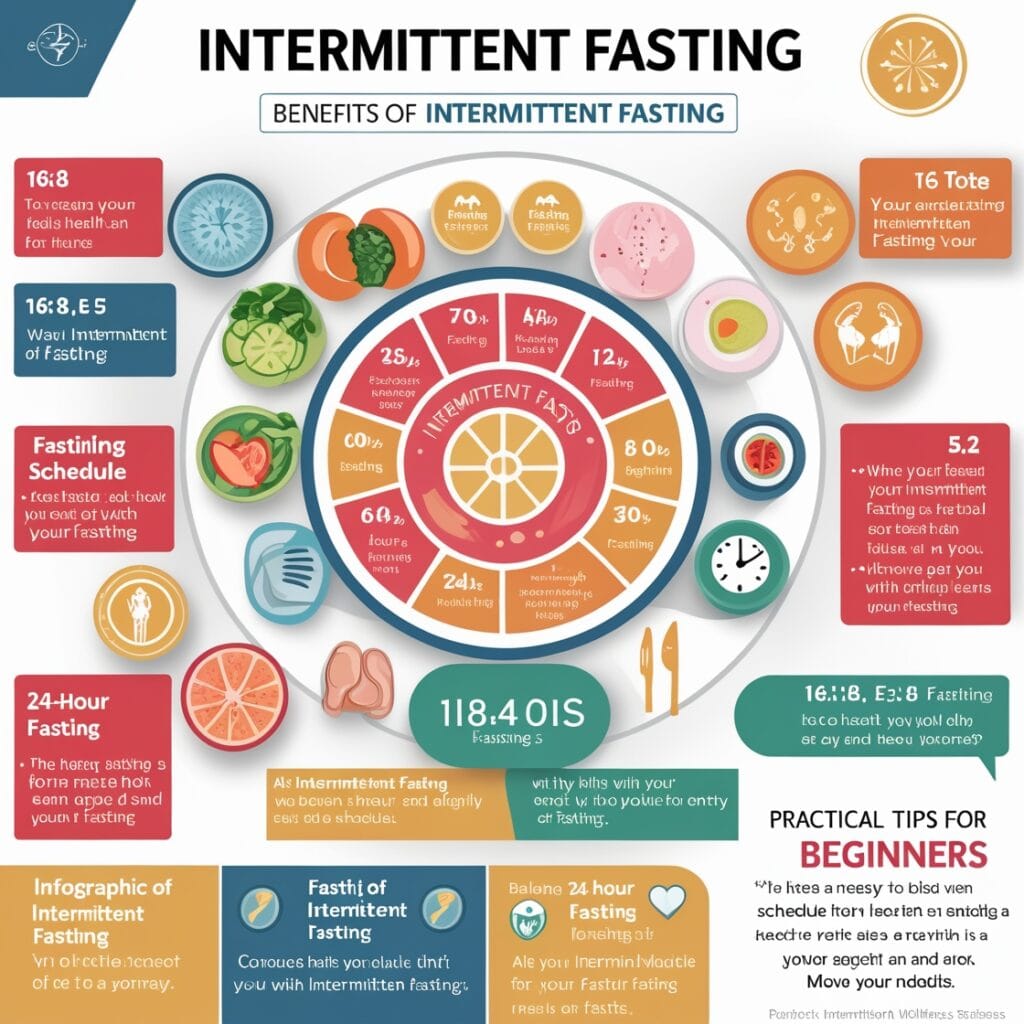Introduction
Intermittent fasting (IF) has emerged as a favored lifestyle option for individuals seeking to enhance their health, shed pounds, and streamline their eating patterns. In contrast to conventional diets that concentrate on what you consume, intermittent fasting focuses on when you consume it. By alternating between eating and fasting intervals, numerous health advantages can be unlocked. If you are a beginner to intermittent fasting, this guide will assist you in understanding the benefits, popular schedules, and practical advice to embark on your journey—all while ensuring you remain healthy and energized.
What is Intermittent Fasting?
Intermittent fasting is a dietary pattern that switches between eating and fasting periods. It does not dictate which foods you should consume but rather emphasizes when to consume them. The objective is to give your body a respite from ongoing digestion, enabling it to utilize stored energy (fat) and conduct repairs. This method has been practiced for centuries and is validated by contemporary scientific studies.
Benefits of Intermittent Fasting
Intermittent fasting provides a broad array of benefits, supported by both scientific research and tangible success stories. Here are some of the most significant benefits:
- Weight Loss and Furningat B
Intermittent fasting facilitates weight loss by inducing a calorie deficit. During fasting periods, your body burns stored fat for energy, resulting in fat reduction. Furthermore, fasting elevates norepinephrine levels, a hormone that accelerates metabolism.
- Improved Insulin Sensitivity
Fasting can decrease blood sugar levels and enhance insulin sensitivity, thereby minimizing the risk of type 2 diabetes. By pausing constant eating, you permit your body to manage blood sugar more efficiently.
- Enhanced Brain Health
Intermittent fasting may enhance cognitive function by increasing the production of brain-derived neurotrophic factor (BDNF), a protein vital for maintaining cognitive health. It is also associated with a lowered risk of neurodegenerative conditions like Alzheimer’s.
- Cellular Repair and Autophagy
While fasting, your cells begin a process known as autophagy, where they eliminate damaged elements and recycle them. This cellular maintenance can decelerate aging and mitigate the risk of various diseases.
- Reduced Inflammation
Intermittent fasting has been demonstrated to lessen inflammation, a significant contributor to numerous chronic ailments, including heart disease and arthritis.
- Simplicity and Convenience
Unlike intricate diets, intermittent fasting is simple. You do not need to track calorie intake or prepare special meals—just modify your eating window.
Also Read: How to Control Your Mind: 10 Proven Techniques to Mastering Your Thoughts for a Better Life
Popular Intermittent Fasting Schedules
Numerous intermittent fasting schedules are available based on your lifestyle and objectives. Here are the most widely recognized:
- The 16/8 Method
- How It Works: Fast for 16 hours and consume food during an 8-hour window. For instance, eat between 12 PM and 8 PM, then fast until noon the following day.
- Best For: Beginners and individuals seeking a sustainable routine.
- The 5:2 Diet
- How It Works: Eat normally for 5 days and limit calorie intake to 500-600 on 2 non-consecutive days.
- Best For: Those who wish for flexibility and prefer not to fast daily.
- Eat-Stop-Eat
- How It Works: Fast for a complete 24 hours either once or twice a week. For instance, have your last meal at 7 PM and wait until 7 PM the following day to eat again.
- Best For: Seasoned fasters seeking a challenge.
- Alternate-Day Fasting
- How It Works: Switch between fasting days (consuming very little or nothing) and regular eating days.
- Best For: Individuals aiming for quick weight loss.
- The Warrior Diet
- How It Works: Fast for 20 hours and then have one substantial meal within a 4-hour period in the evening.
- Best For: Individuals who prefer to consume one large meal per day.
Also Read: 10 Powerful Time Management Tips to Boost Your Productivity in 2025
Tips for Beginners
Initiating intermittent fasting can be demanding, but these suggestions will help you transition smoothly and remain on course:
- Start Slowly
If you are unfamiliar with fasting, begin with a shorter fasting period, such as 12 hours, and progressively extend it as your body adjusts.
- Stay Hydrated
Consume plenty of water during fasting intervals to maintain hydration and reduce hunger. Black coffee and herbal teas are also allowed.
- Choose Nutrient-Dense Foods
When you conclude your fast, concentrate on whole, nutrient-rich foods such as lean proteins, healthy fats, and vegetables. Avoid sugary snacks and processed foods.
- Listen to Your Body
If you experience dizziness, weakness, or excessive hunger, it is acceptable to end your fast early. Intermittent fasting should feel manageable and not punitive.
- Combine with Exercise
Mild activities like walking or yoga can be performed during fasting times. Reserve intense workouts for your eating window to nourish your body appropriately.
- Be Consistent
Consistency is essential for achieving results. Adhere to your selected schedule for a minimum of a few weeks to enable your body to adjust.
- Track Your Progress
Maintain a journal to record your fasting durations, meals, and your feelings. This will aid in determining what works best for you.
Also Read: The 5-Minute Daily Habit Menu That Actually Works
Common Mistakes to Avoid
- Overeating During Eating Windows: Fasting does not provide a free pass to overeat. Adhere to balanced, portion-controlled meals.
- Ignoring Hydration: Dehydration can complicate fasting. Ensure you drink water throughout the day.
- Starting Too Aggressively: Diving into a strict fasting regimen can lead to exhaustion. Gradually ease into it.
- Neglecting Nutrition: Fasting does not equate to bypassing nutrients. Prioritize whole, healthy foods.
Conclusion
Intermittent fasting is an effective strategy for enhancing your health, shedding pounds, and streamlining your eating patterns. With a variety of schedules available, it can be flexible enough to accommodate almost any lifestyle. As a newcomer, start gradually, maintain consistency, and pay attention to your body’s signals. Over time, you will likely observe not only physical transformations but also increased energy levels and enhanced mental clarity. Try it out—your body may very well appreciate it!

